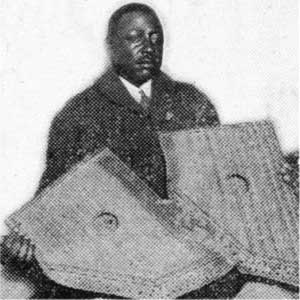
Washington Phillips (January 11, 1880 – September 20, 1954) was a Texan gospel singer and musician.The mystery begins the first time you hear the flowing gospel of Washington Phillips, whose entire recorded output consists of 18 songs recorded from 1927- 1929. His sweetly-sung Christian blues, bathed in a celestial haze of notes from an instrument that sounds like a child's music box, stand out amongst the work of guitar evangelists and street corner Scripture-ites of the era. Phillips' sacred porch songs provide evidence of a higher power, for how could man alone create music for the angels? After his five sessions in a Dallas studio, where he'd been summoned by Columbia Records field recorder Frank Walker, Phillips faded back into obscurity. Ry Cooder led a slight revival in 1971, when he covered Phillips' "Denomination Blues," and newer bands, such as Austin's Knife In the Water, have interpreted his moralistic lullabies for the art rock crowd. For the most part, however, Phillips is virtually unknown except to a cult of rabid musicologists, who revel in the mystique of the man who emerged out of nowhere as a fully-formed artist and just as quickly disappeared.Phillips had some success with his first '78, "Take Your Burden To the Lord" b/w "Lift Him Up That's All," which sold just over 8,000 copies in 1928. (An average Bessie Smith record at the time would sell about 10,000.) Then came the stock market crash of 1929 and the Great Depression. The scouts and field recorders stopped coming from New York in search of raw talent and the labels instead focused on making more refined records which would comply with the escapism sought by a dire populace. In the 1920's, Texans such as blind Pentecostal pianist Arizona Juanita Dranes of Dallas and Marlin's Blind Willie Johnson, whose classic compositions have been covered by Led Zeppelin ("Nobody's Fault But Mine") and Eric Clapton ("Motherless Children") were spicing "Negro spirituals" and songs of praise with barrelhouse piano and slide guitar before anyone else. But the innovative recordings from Texas suddenly stopped. Like Phillips, Dranes made her last recordings in 1929 and Johnson never stepped inside a studio again after April 1930.
The "real" Washington Phillips returned to the farming life in the black settlement of Simsboro, content to play for neighbors and churchgoers until 1954, when, at age 74, he died of head injuries suffered from a fall down the stairs at the welfare office in nearby Teague. It turned out that the body had been exhumed the day after it was buried and taken back to Teague, about sixty miles east of Waco, by brother Sim Phillips. Phillips died in 1954 in Teague, Texas.Phillips recorded eighteen songs, all between 1927 and 1929, though only sixteen survive. Some of his songs amount to highly specific and detailed gospel sermons, featuring Phillips' voice self-accompanied by an instrument that sounds like a fretless zither. This instrument, which has been variously identified as a Dolceola, a Celestaphone, two Celestaphones tuned in octaves attached side-by-side, or a Phonoharp (and also is considered by some to be an instrument entirely home-made by Phillips) creates a unique sound on these recordings that makes them immediately recognizable.
No comments:
Post a Comment